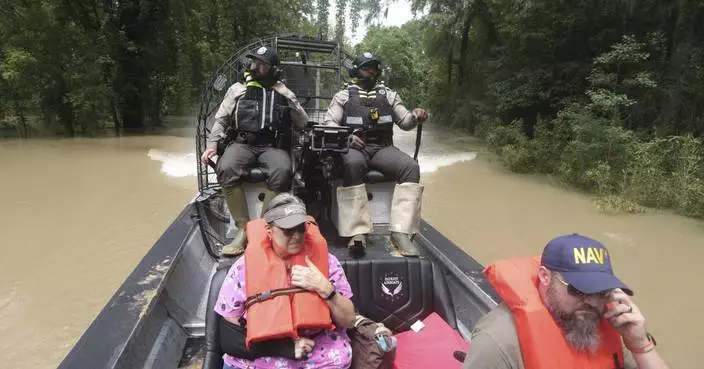ARNHEM, Netherlands (AP) — Just like the animals on Noah’s Ark, the corals arrived in a pair.
On Monday, divers with gloved hands gently nestled the self-bred corals from the World Coral Conservatory project among their cousins in Europe’s largest coral reef at the Burgers’ Zoo in the Netherlands.
Click to Gallery
ARNHEM, Netherlands (AP) — Just like the animals on Noah’s Ark, the corals arrived in a pair.
Divers with gloved hands gently nestled the first self-bred corals from the World Coral Conservatory project amongst their cousins in Europe's largest coral reef at the Burgers' Zoo in Arnhem, eastern Netherlands, Monday, April 22, 2024. (AP Photo/Peter Dejong)
Divers with gloved hands gently nestled the first self-bred corals from the World Coral Conservatory project amongst their cousins in Europe's largest coral reef at the Burgers' Zoo in Arnhem, eastern Netherlands, Monday, April 22, 2024. (AP Photo/Peter Dejong)
Divers with gloved hands gently nestled the first self-bred corals from the World Coral Conservatory project amongst their cousins in Europe's largest coral reef at the Burgers' Zoo in Arnhem, eastern Netherlands, Monday, April 22, 2024. (AP Photo/Peter Dejong)
A fish swims in a coral reef as divers with gloved hands gently nestled the first self-bred corals from the World Coral Conservatory project amongst their cousins in Europe's largest coral reef at the Burgers' Zoo in Arnhem, eastern Netherlands, Monday, April 22, 2024. (AP Photo/Peter Dejong)
Divers with gloved hands gently nestled the first self-bred corals from the World Coral Conservatory project amongst their cousins in Europe's largest coral reef at the Burgers' Zoo in Arnhem, eastern Netherlands, Monday, April 22, 2024. (AP Photo/Peter Dejong)
“This is the first project where we started to keep these corals with a known origin. As we know exactly where they’re coming from, they have the potential to be placed back into the wild. … So it is very important to keep these corals, as it’s going not very well in the wild,” Nienke Klerks, a biologist at the Royal Burgers’ Zoo in Arnhem, told The Associated Press.
It’s among several projects worldwide seeking to address the decline of coral reef populations, which are suffering from bleaching caused by rising sea temperatures. Corals are central to marine ecosystems, and while these projects won’t stem the tide of damage from human-caused climate change, they are seen as part of broader solutions.
The World Coral Conservatory hopes to create a bank of corals in aquariums across Europe that could be used to repopulate wild coral reefs if they succumb to the stress of climate change or pollution.
Along with two zoos in France and the originator of the project — the Monaco Scientific Center — the zoo in the east of the Netherlands took in more than a dozen coral fragments from off the coast of Seychelles in east Africa.
The Dutch zoo has been propagating the corals since 2022, allowing them to grow in a highly regulated environment before they were large enough to join the rest of the reef.
“We test it behind the scenes … what works for these corals. In that way, we know where to place them and how to keep them,” zookeeper Pascal Kik said.
Each diver held up a coral — one that resembled a large mushroom, the other a decorative cookie — to be photographed by reporters before placing them on a ledge near the center of the 8-million-liter (2.1-million-gallon) tank.
Few of the other corals at the zoo come from the wild. They are either shared by other zoos or turned over by Dutch customs officers after being confiscated. Coral poaching is a major threat to coral reefs in parts of Asia.
That would make it difficult to return the corals to the wild. But the team knows exactly where their 14 corals came from, making it more likely they could be successfully reintroduced if needed.
Corals area keystone marine species, according to Mark Eakin, executive secretary for the International Coral Reef Society. Eakin, retired coral monitoring chief at the U.S. National Oceanic and Atmospheric Administration, says that around 25% of marine animals spend some part of their lives dependent on coral reefs.
That makes projects such as the one in Arnhem all the more important to pursue, he said.
“We are in a situation where we really need to be taking any possible action we can,” Eakin told AP.
Earlier in April, scientists from the NOAA and International Coral Reef Initiative said that coral reefs around the world are experiencing global bleaching for the fourth time.
Bleaching occurs when coral under stress expels the algae that gives them their vibrant colors. The algae is also a coral’s food source, and if the bleaching lasts for too long or is too severe, the coral could die.
In the world’s largest coral reef ecosystem, Australia’s Great Barrier Reef, bleaching affected 90% of the coral assessed in 2022. The Florida Coral Reef, the third-largest, experienced significant bleaching last year.
Terry Hughes of Australia’s James Cook University, an expert on the Great Barrier Reef, argues that the world needs faster, bolder efforts to stop the damage from climate change, instead of small-scale restoration projects like this one.
“You can’t replace a magnificent ecosystem with an aquarium,” he said.
Others say every little bit helps.
“Coral reefs would be one of the first systems to totally collapse due to climate change,’’ said Ronald Osinga, a marine biologist who specializes in corals at Wageningen University in the Netherlands.
“It’s sad that it has to be like this,” said Osinga, who is not involved in the Dutch zoo initiative. But projects like this are a “good backup plan.”
Follow AP climate coverage at: https://apnews.com/hub/climate-change
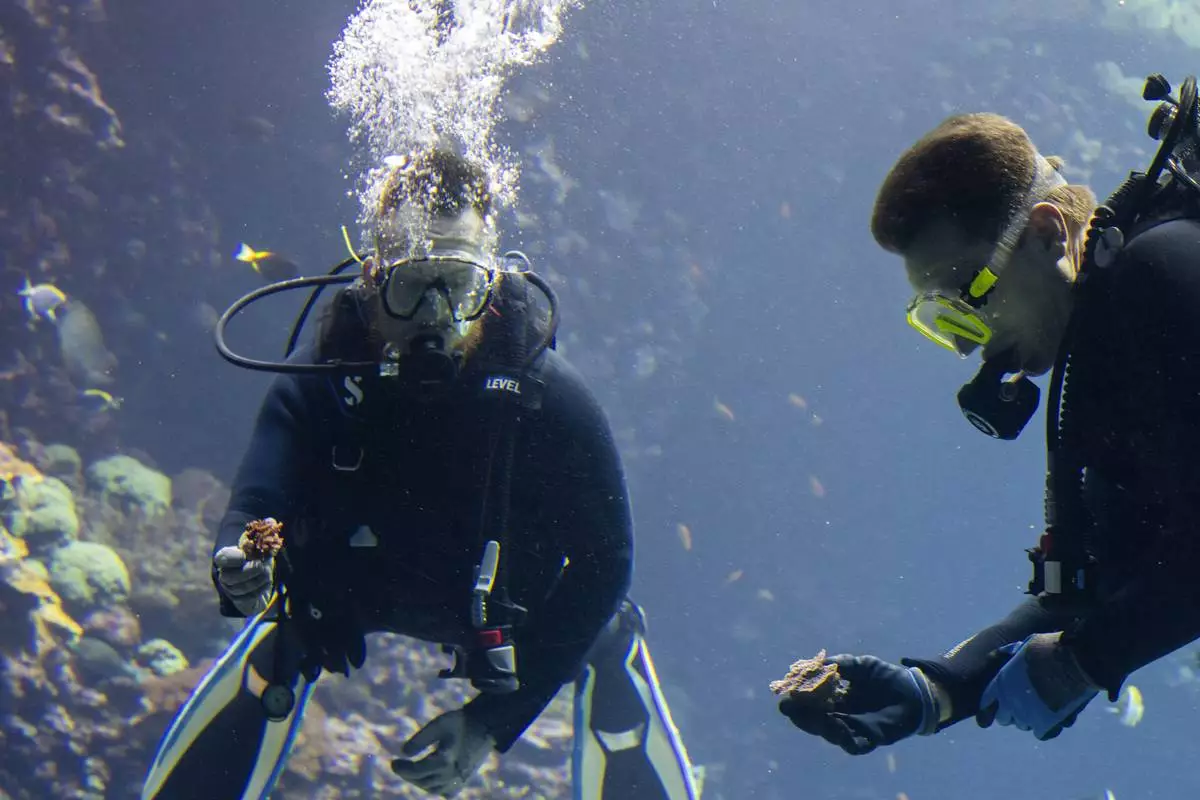
Divers with gloved hands gently nestled the first self-bred corals from the World Coral Conservatory project amongst their cousins in Europe's largest coral reef at the Burgers' Zoo in Arnhem, eastern Netherlands, Monday, April 22, 2024. (AP Photo/Peter Dejong)
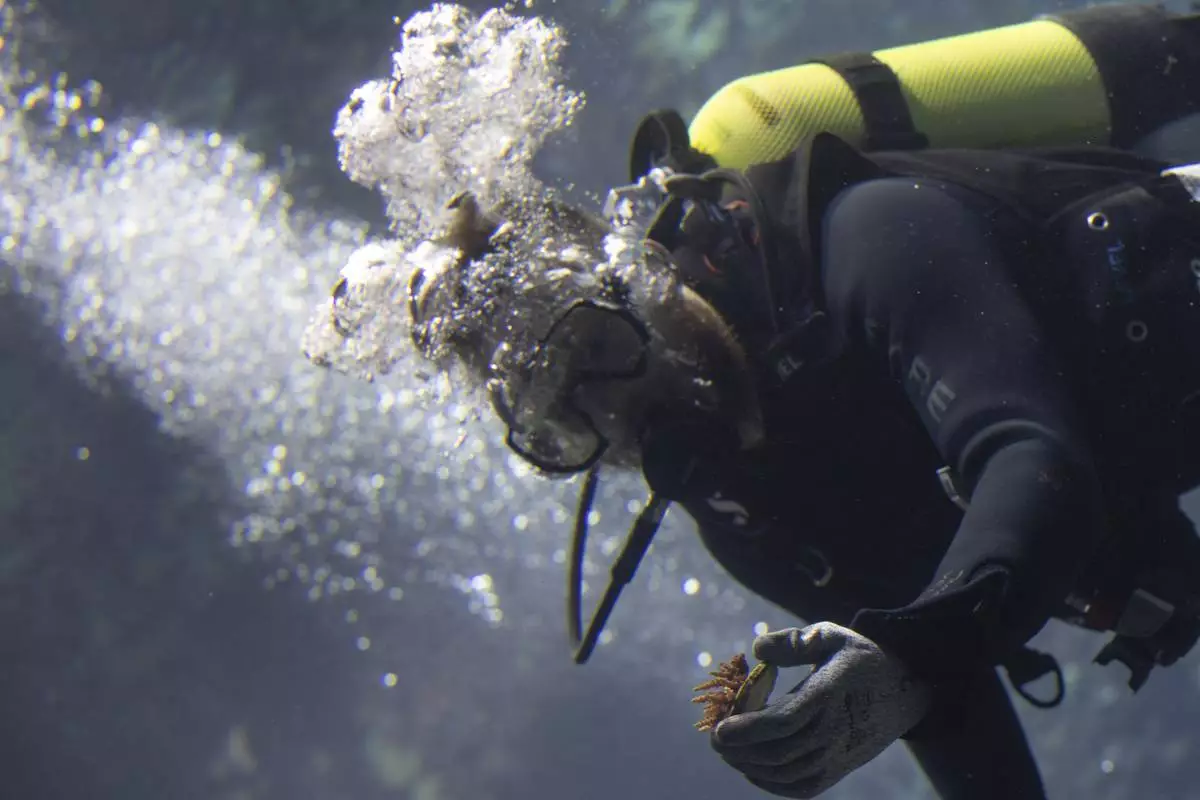
Divers with gloved hands gently nestled the first self-bred corals from the World Coral Conservatory project amongst their cousins in Europe's largest coral reef at the Burgers' Zoo in Arnhem, eastern Netherlands, Monday, April 22, 2024. (AP Photo/Peter Dejong)
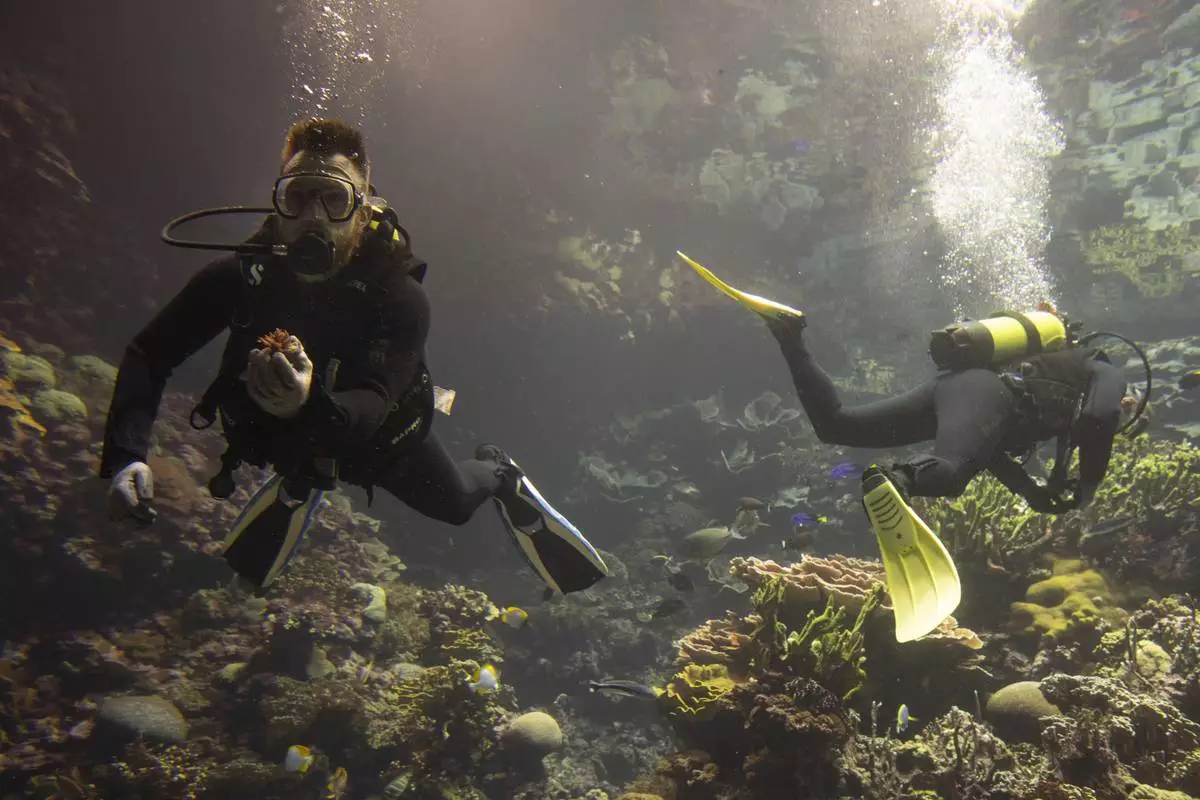
Divers with gloved hands gently nestled the first self-bred corals from the World Coral Conservatory project amongst their cousins in Europe's largest coral reef at the Burgers' Zoo in Arnhem, eastern Netherlands, Monday, April 22, 2024. (AP Photo/Peter Dejong)
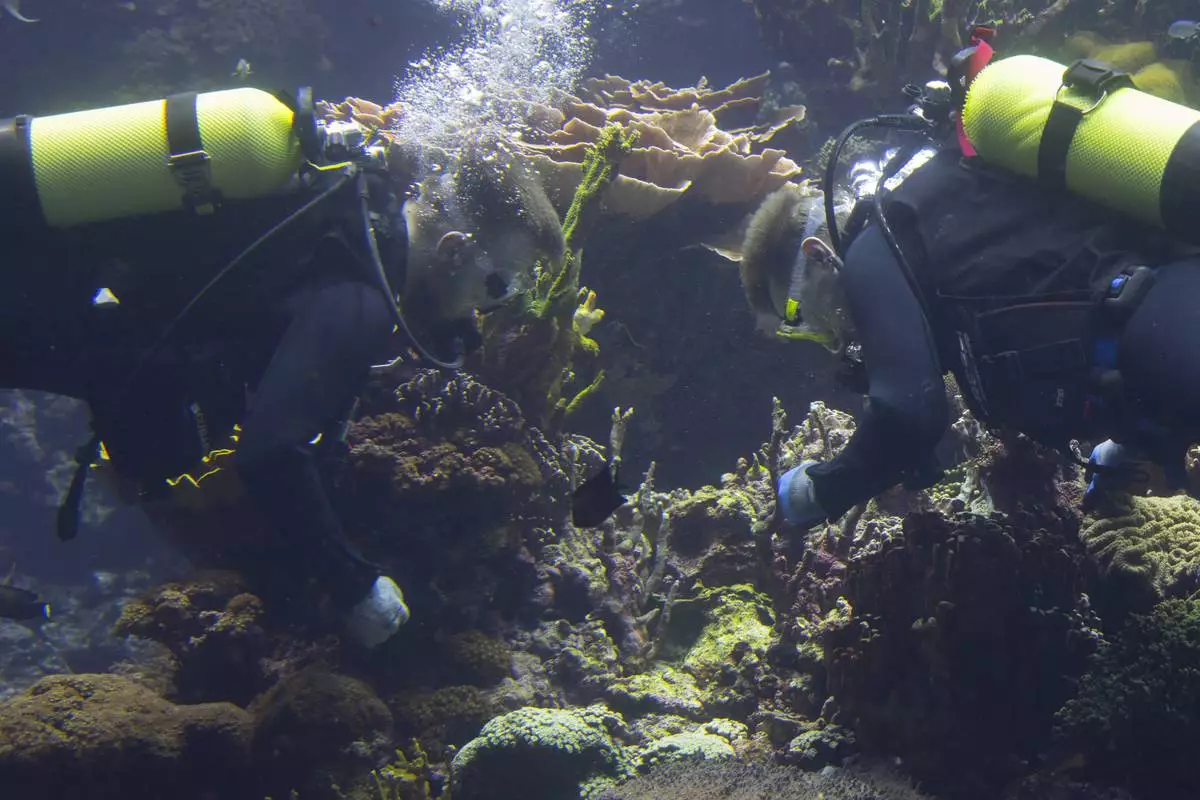
Divers with gloved hands gently nestled the first self-bred corals from the World Coral Conservatory project amongst their cousins in Europe's largest coral reef at the Burgers' Zoo in Arnhem, eastern Netherlands, Monday, April 22, 2024. (AP Photo/Peter Dejong)

A fish swims in a coral reef as divers with gloved hands gently nestled the first self-bred corals from the World Coral Conservatory project amongst their cousins in Europe's largest coral reef at the Burgers' Zoo in Arnhem, eastern Netherlands, Monday, April 22, 2024. (AP Photo/Peter Dejong)

Divers with gloved hands gently nestled the first self-bred corals from the World Coral Conservatory project amongst their cousins in Europe's largest coral reef at the Burgers' Zoo in Arnhem, eastern Netherlands, Monday, April 22, 2024. (AP Photo/Peter Dejong)
JERUSALEM (AP) — Hamas announced Monday it has accepted an Egyptian-Qatari proposal for a cease-fire to halt the seven-month-long war with Israel in Gaza, hours after Israel ordered about 100,000 Palestinians to begin evacuating from the southern city of Rafah, signaling that a long-promised ground invasion there could be imminent.
There was no immediate comment from Israel on the deal, and details of the proposal have not yet been released. In recent days, Egyptian and Hamas officials have said the cease-fire would take place in a series of stages during which Hamas would release hostages it is holding in exchange for Israeli troop pullbacks from Gaza.
It is not clear whether the deal will meet Hamas’ key demand of bringing about an end to the war and complete Israeli withdrawal.
Hamas said in a statement its top leader, Ismail Haniyeh, had delivered the news in a phone call with Qatar’s prime minister and Egypt’s intelligence minister. After the release of the statement, Palestinians erupted in cheers in the sprawling tent camps around Rafah, hoping the deal meant an Israeli attack had been averted.
Israel’s closest allies, including the United States, have repeatedly said that Israel shouldn't attack Rafah. The looming operation has raised global alarm over the fate of around 1.4 million Palestinians sheltering there.
Aid agencies have warned that an offensive will worsen Gaza's humanitarian catastrophe and bring a surge of more civilian deaths in an Israeli campaign that in nearly seven months has killed 34,000 people and devastated the territory.
U.S. President Joe Biden spoke Monday with Israeli Prime Minister Benjamin Netanyahu and reiterated U.S. concerns about an invasion of Rafah. Biden said that a cease-fire with Hamas is the best way to protect the lives of Israeli hostages held in Gaza, a National Security Council spokesperson said on condition of anonymity to discuss the call before an official White House statement was released.
Hamas and key mediator Qatar said that invading Rafah will derail efforts by international mediators to broker a cease-fire. Days earlier, Hamas had been discussing a U.S.-backed proposal that reportedly raised the possibility of an end to the war and a pullout of Israeli troops in return for the release of all hostages held by the group. Israeli officials have rejected that trade-off, vowing to continue their campaign until Hamas is destroyed.
Netanyahu said Monday that seizing Rafah, which Israel says is the last significant Hamas stronghold in Gaza, was vital to ensuring the militants can't rebuild their military capabilities and repeat the Oct. 7 attack on Israel that triggered the war.
Lt. Col. Nadav Shoshani, an army spokesman, said about 100,000 people were being ordered to move from parts of Rafah to a nearby Israel-declared humanitarian zone called Muwasi, a makeshift camp on the coast. He said that Israel has expanded the size of the zone and that it included tents, food, water and field hospitals.
It wasn't immediately clear, however, if that material was already in place to accommodate the new arrivals.
Around 450,000 displaced Palestinians already are sheltering in Muwasi. The U.N. agency for Palestinian refugees, known as UNRWA, said it has been providing them with aid. But conditions are squalid, with few bathrooms or sanitation facilities in the largely rural area, forcing families to dig private latrines.
After the evacuation order announcement Monday, Palestinians in Rafah wrestled with having to uproot their extended families once again for an unknown fate, exhausted after months living in sprawling tent camps or crammed into schools or other shelters in and around the city. Few who spoke to The Associated Press wanted to risk staying.
Mohammed Jindiyah said that at the beginning of the war, he had tried to hold out in his home in northern Gaza after Israel ordered an evacuation there in October. He ended up suffering through heavy bombardment before fleeing to Rafah.
He’s complying with the order this time, but was unsure now whether to move to Muwasi or another town in central Gaza.
“We are 12 families, and we don’t know where to go. There is no safe area in Gaza,” he said.
Sahar Abu Nahel, who fled to Rafah with 20 family members including her children and grandchildren, wiped tears from her cheeks, despairing at a new move.
“I have no money or anything. I am seriously tired, as are the children,” she said. “Maybe it’s more honorable for us to die. We are being humiliated.”
Israeli military leaflets were dropped with maps detailing a number of eastern neighborhoods of Rafah to evacuate, warning that an attack was imminent and anyone who stays “puts themselves and their family members in danger.” Text messages and radio broadcasts repeated the message.
UNRWA won't evacuate from Rafah so it can continue to provide aid to those who stay behind, said Scott Anderson, the agency's director in Gaza.
“We will provide aid to people wherever they choose to be,” he told the AP.
The U.N. says an attack on Rafah could disrupt the distribution of aid keeping Palestinians alive across Gaza. The Rafah crossing into Egypt, a main entry point for aid to Gaza, lies in the evacuation zone. The crossing remained open Monday after the Israeli order.
Jan Egeland, secretary-general of the Norwegian Refugee Council, condemned the “forced, unlawful” evacuation order and the idea that people should go to Muwasi.
“The area is already overstretched and devoid of vital services,” Egeland said. He said that an Israeli assault could lead to “the deadliest phase of this war.”
Israel’s bombardment and ground offensives in Gaza have killed more than 34,700 Palestinians, around two-thirds of them children and women, according to Gaza health officials. The tally doesn't distinguish between civilians and combatants. More than 80% of the population of 2.3 million have been driven from their homes, and hundreds of thousands in the north are on the brink of famine, according to the U.N.
Tensions escalated Sunday when Hamas fired rockets at Israeli troops positioned on the border with Gaza near Israel’s main crossing for delivering humanitarian aid, killing four soldiers. Israel shuttered the crossing — but Shoshani said it wouldn't affect how much aid enters Gaza as others are working.
Meanwhile, Israeli airstrikes on Rafah killed 22 people, including children and two infants, according to a hospital.
The war was sparked by the unprecedented Oct. 7 raid into southern Israel in which Hamas and other militants killed around 1,200 people, mostly civilians, and abducted around 250 hostages. After exchanges during a November cease-fire, Hamas is believed to still hold about 100 Israelis captive as well the bodies of around 30 others.
The mediators over the cease-fire — the United States, Egypt and Qatar — had appeared to scramble to salvage a cease-fire deal they had been trying to push through the past week. Egypt said it was in touch with all sides Monday to “prevent the situation from … getting out of control.”
CIA Director William Burns, who had been in Cairo for talks on the deal, headed to meet the prime minister of Qatar, an official familiar with the matter said. It wasn't clear whether a subsequent trip to Israel that had been planned would happen. The official spoke on condition of anonymity to discuss the closed-door negotiations.
In a fiery speech Sunday evening marking Israel's Holocaust memorial day, Netanyahu rejected international pressure to halt the war, saying that “if Israel is forced to stand alone, Israel will stand alone.”
On Monday, Netanyahu accused Hamas of “torpedoing” a deal by not budging from its demand for an end to the war and a complete Israeli troop withdrawal in return for the hostages’ release, which he called “extreme.”
Bassem Mroue reported from Beirut. Zeke Miller contributed to this report from Washington.
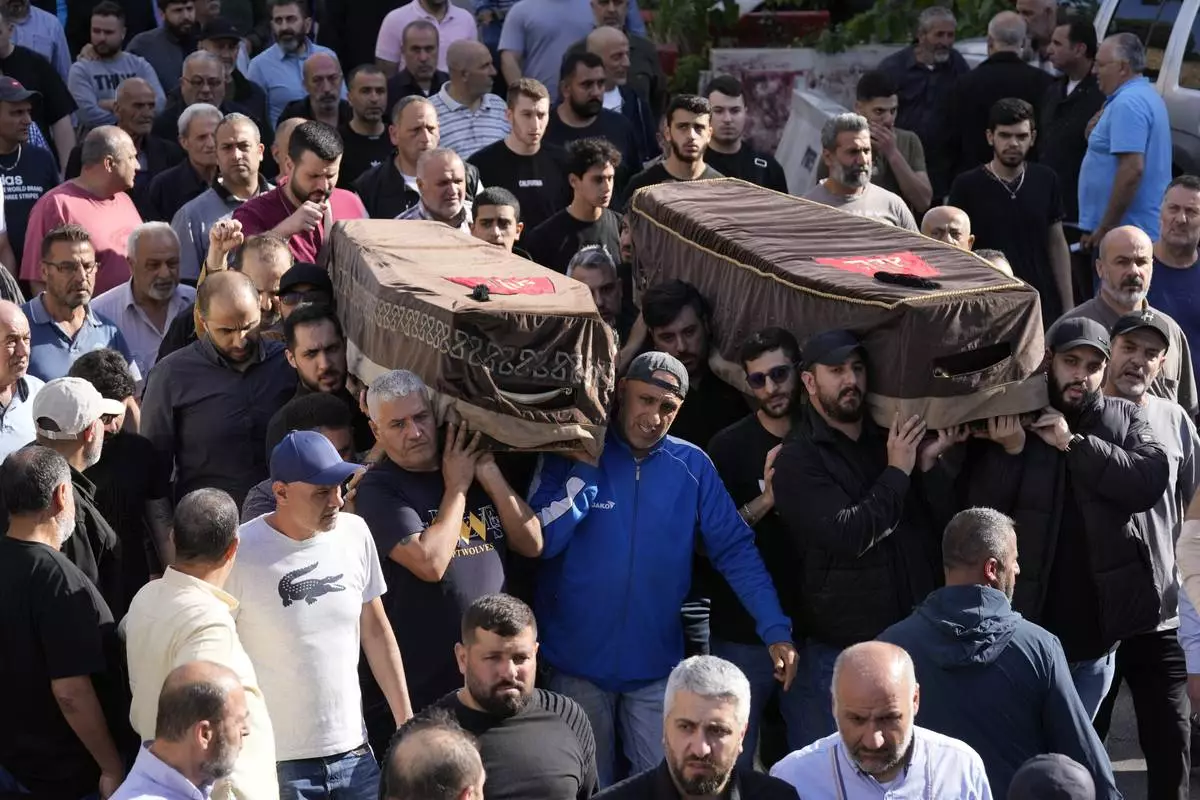
Mourners carry the coffins of two victims who were among four civilians from the same family that killed on Sunday by Israeli strikes on the southern town of Mays al-Jabal, during their funeral procession, in Beirut, Monday, May 6, 2024. Hezbollah militants and Israeli forces have been exchanging fire in south Lebanon since a day after the Israel-Hamas war began on Oct. 7. (AP Photo/Hussein Malla)
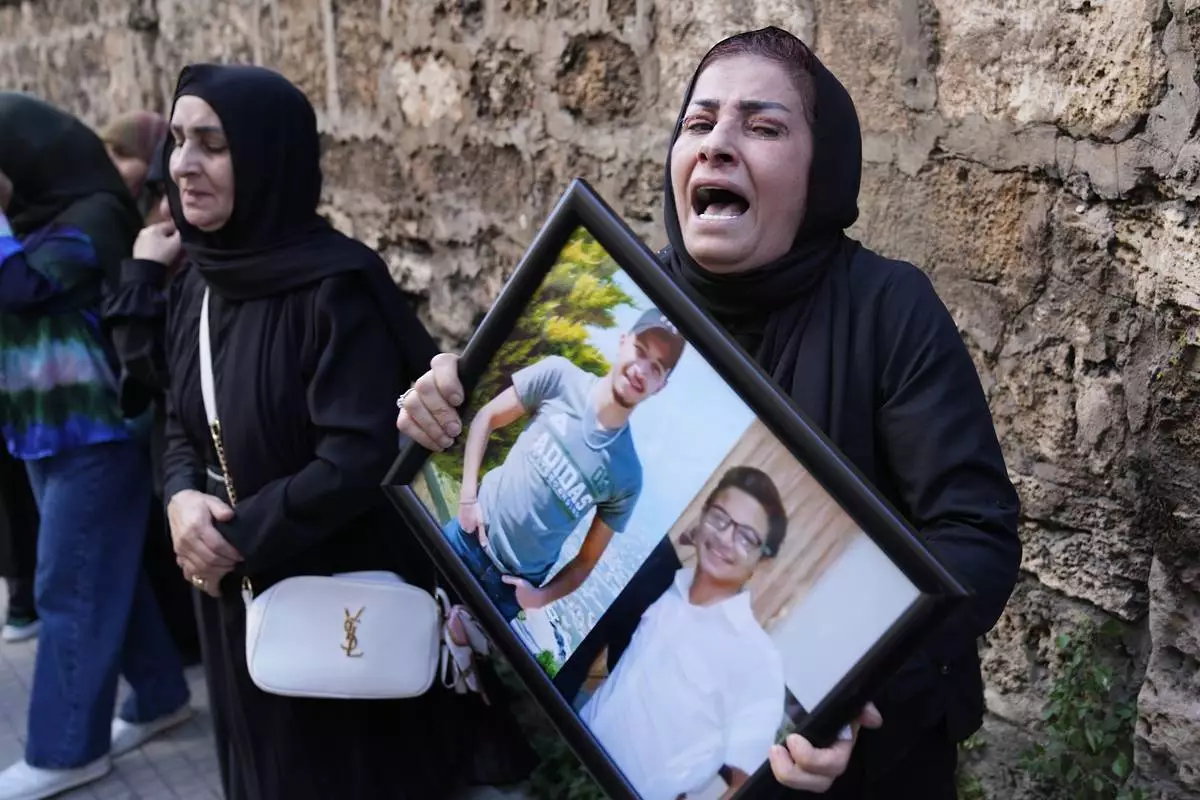
A Lebanese woman mourns, as she holds a frame with the portraits of two victims who were among four civilians from the same family that killed on Sunday by Israeli strikes on the southern town of Mays al-Jabal, during their funeral procession, in Beirut, Monday, May 6, 2024. Hezbollah militants and Israeli forces have been exchanging fire in south Lebanon since a day after the Israel-Hamas war began on Oct. 7. (AP Photo/Hussein Malla)

People attend a ceremony at the former Nazi German death camp of Auschwitz-Birkenau during the annual Holocaust remembrance event, the "March of the Living" in memory of the six million Holocaust victims in Oswiecim, Poland, Monday, May 6, 2024. The event comes amid the dramatic backdrop of the violence of the Israel-Hamas war after the Oct. 7 Hamas attack, the deadliest violence against Jews since the Holocaust, and as pro-Palestinian protests sweep U.S. campuses. (AP Photo/Czarek Sokolowski)
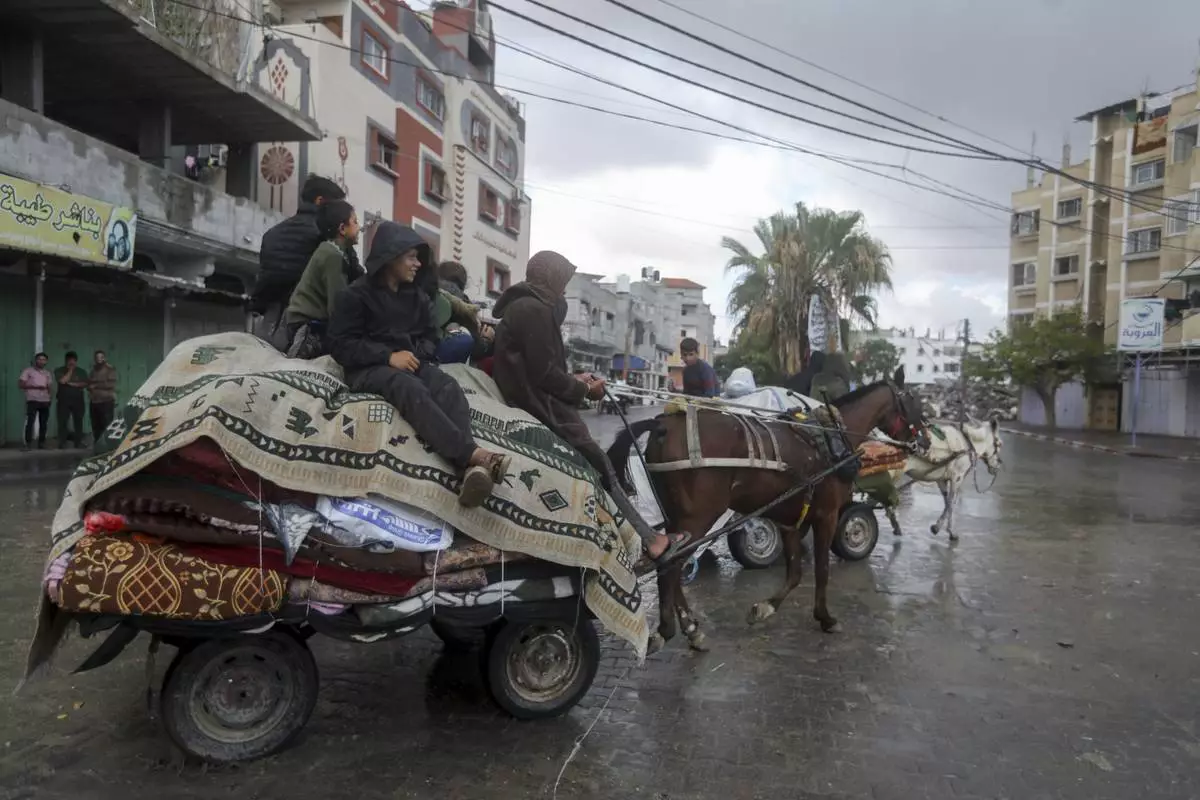
Palestinians flee from the eastern side of the southern Gaza city of Rafah after the Israeli army orders them to evacuate ahead of a military operation, in Rafah, Gaza Strip, Monday, May 6, 2024. The order affects tens of thousands of people and could signal a broader invasion of Rafah, which Israel has identified as Hamas' last major stronghold after seven months of war. (AP Photo/Ismael Abu Dayyah)
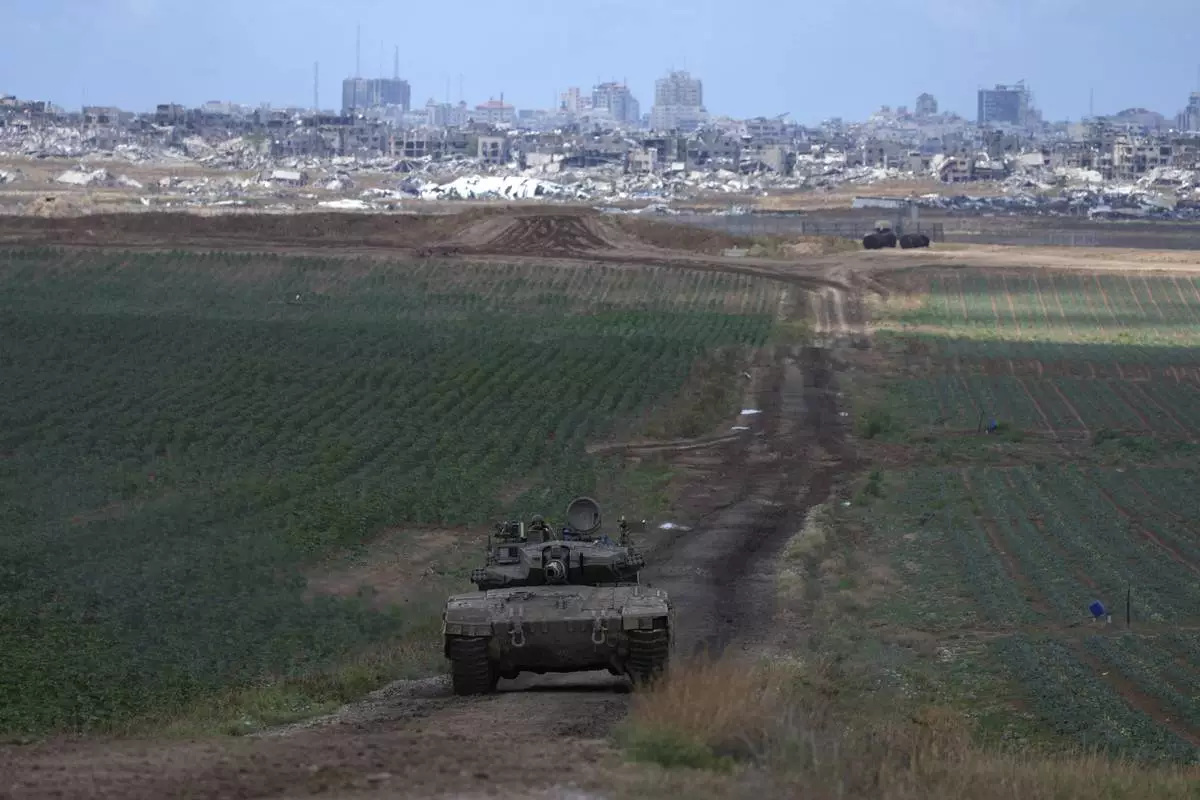
An Israeli Defense Forces tank drives away from the Gaza Strip, as seen from southern Israel, Monday, May 6, 2024. (AP Photo/Tsafrir Abayov)
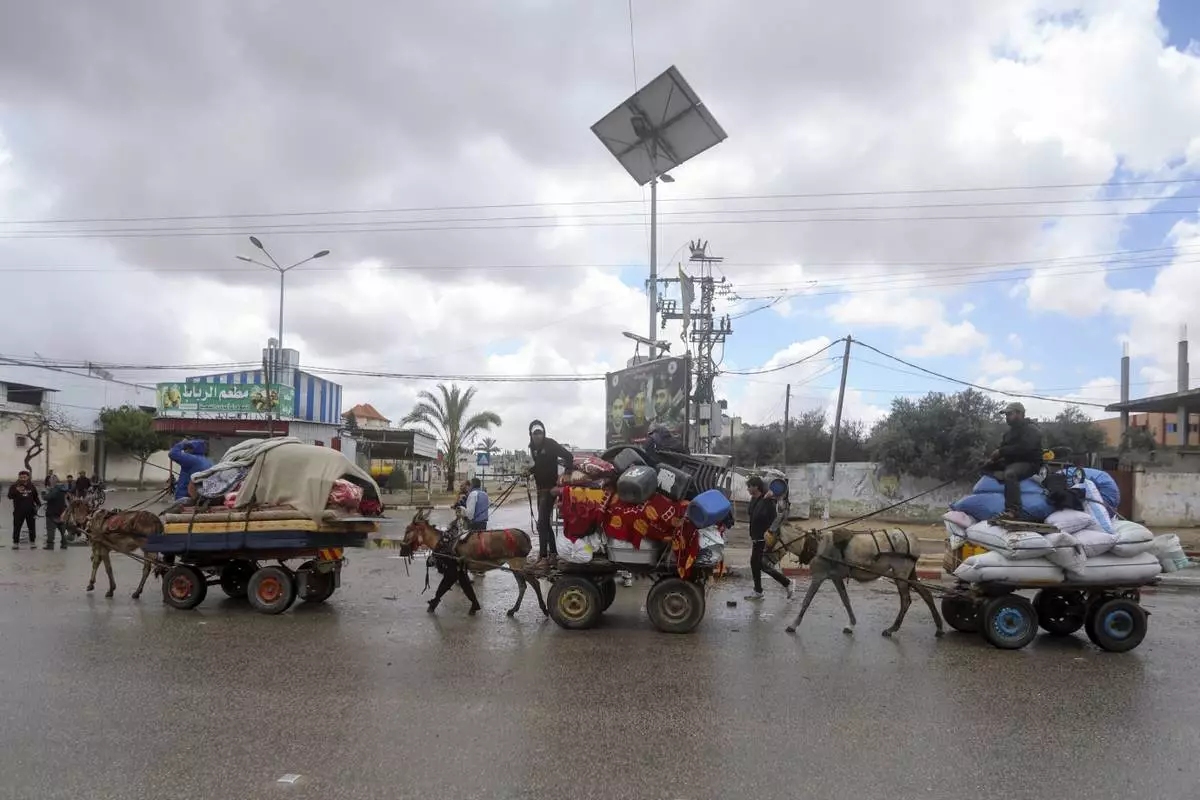
Palestinians flee from the eastern side of the southern Gaza city of Rafah after the Israeli army orders them to evacuate ahead of a military operation, in Rafah, Gaza Strip, Monday, May 6, 2024. The order affects tens of thousands of people and could signal a broader invasion of Rafah, which Israel has identified as Hamas' last major stronghold after seven months of war. (AP Photo/Ismael Abu Dayyah)
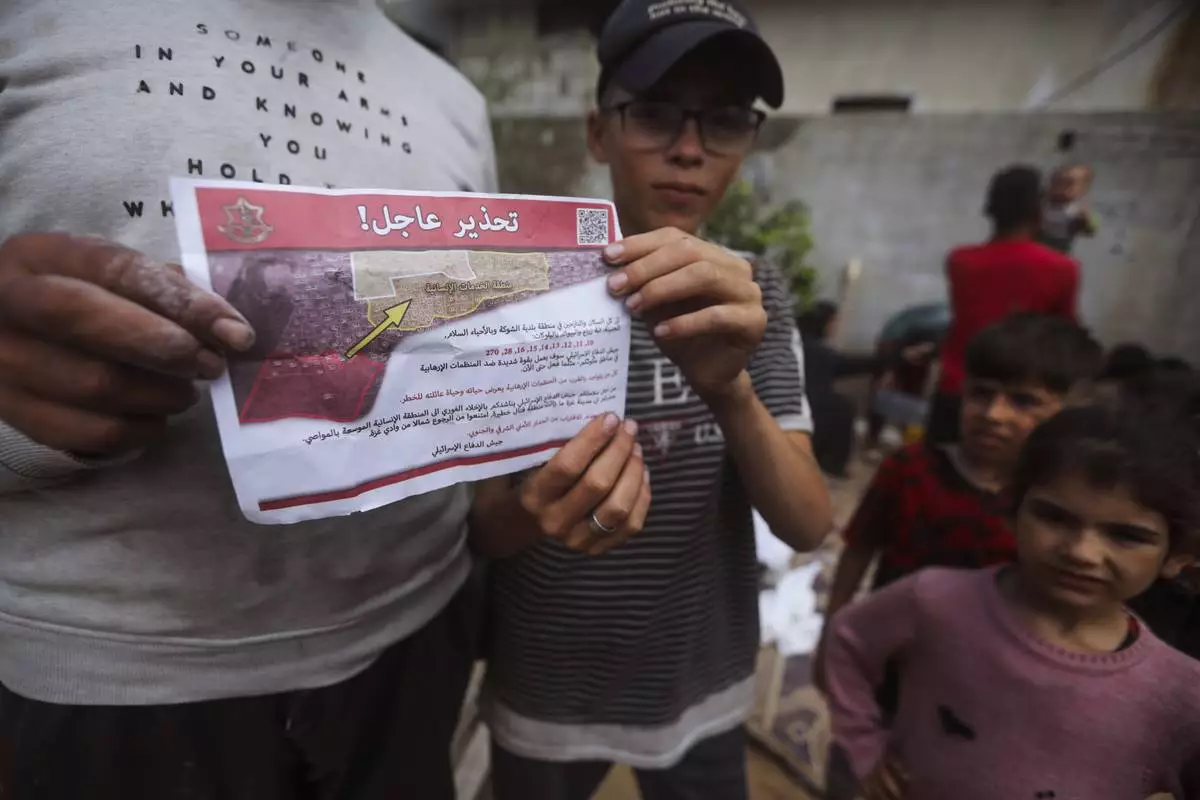
Palestinians hold leaflets dropped by Israeli planes calling on them to evacuate ahead of an Israeli military operation in Rafah, southern Gaza Strip, Monday, May 6, 2024. The order affects tens of thousands of people and could signal a broader invasion of Rafah, which Israel has identified as Hamas' last major stronghold after seven months of war. (AP Photo/Ismael Abu Dayyah)

Israeli soldiers drive a tank at a staging ground near the border with the Gaza Strip, in southern Israel, Sunday, May 5, 2024. (AP Photo/Tsafrir Abayov)
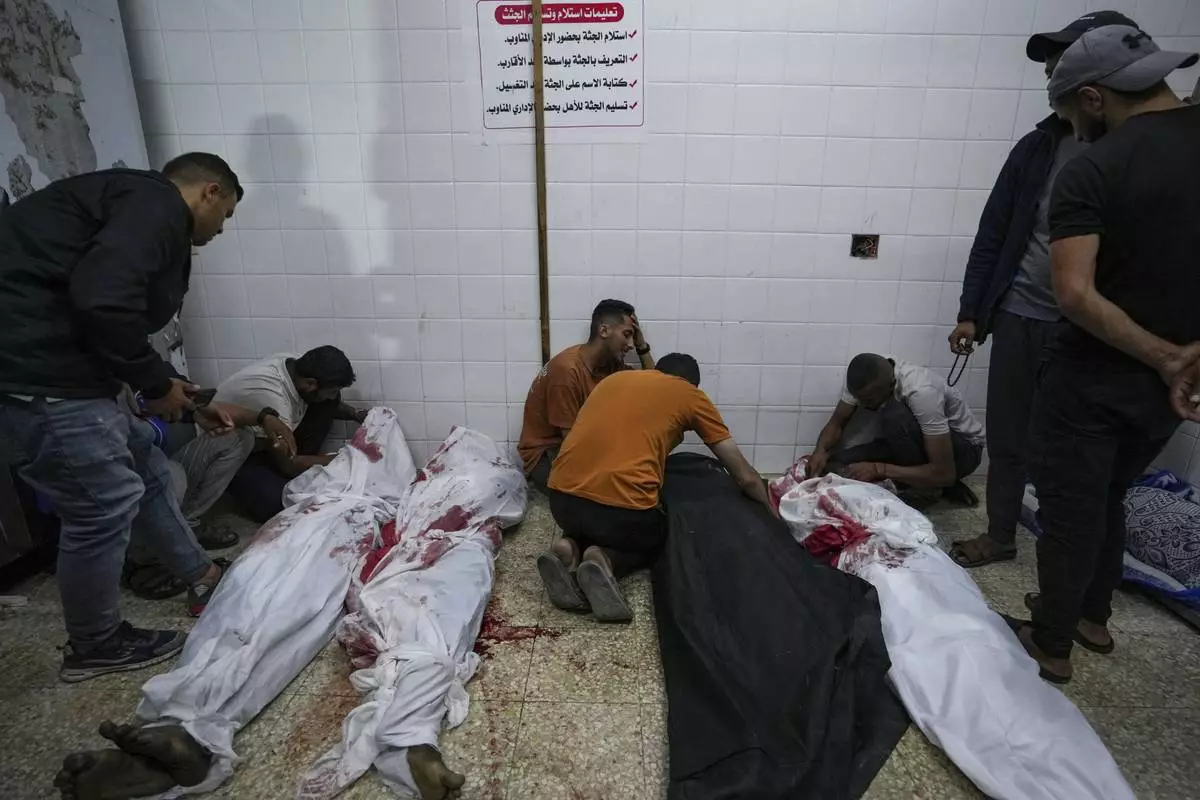
Palestinians react next to the bodies of their relatives who were killed in an Israeli airstrike in Gaza Stirp, at the Al Aqsa hospital in Deir al Balah, Gaza, Sunday, May 5, 2024. (AP Photo/Abdel Kareem Hana)
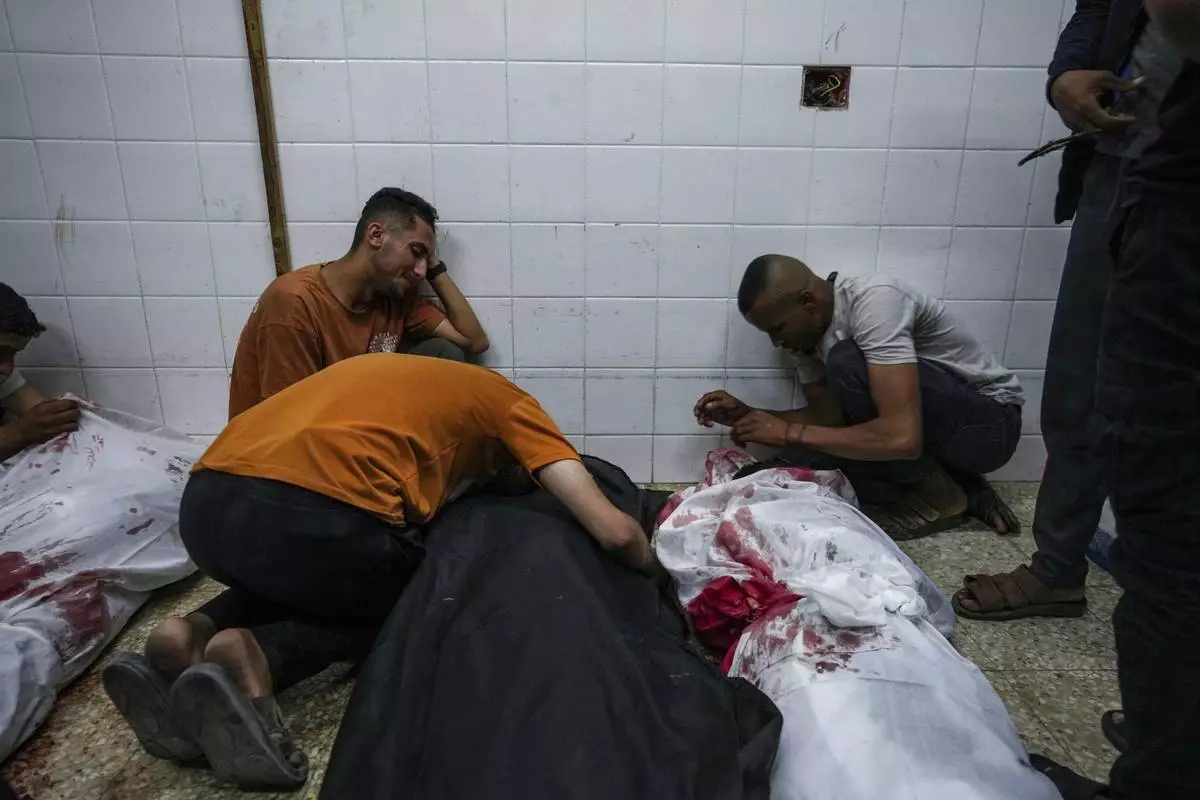
Palestinians react next to the bodies of their relatives who were killed in an Israeli airstrike in Gaza Stirp, at the Al Aqsa hospital in Deir al Balah, Gaza, Sunday, May 5, 2024. (AP Photo/Abdel Kareem Hana)
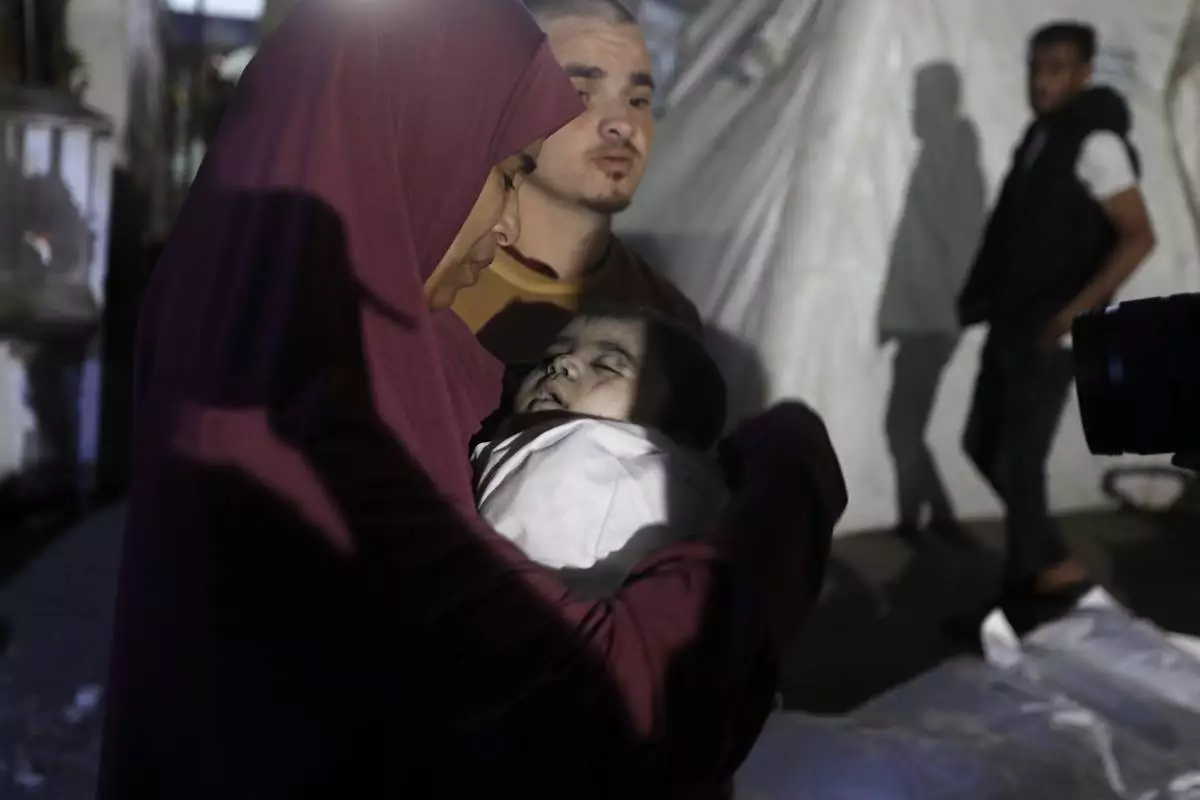
A Palestinian woman mourns her relative, 7-month old baby Hani Qeshta, who was killed in an Israeli bombardment on a residential building with Qeshta's family, at the morgue of Al Najjar hospital in Rafah, southern Gaza Strip, Sunday, May 5, 2024. (AP Photo/Ismael Abu Dayyah)
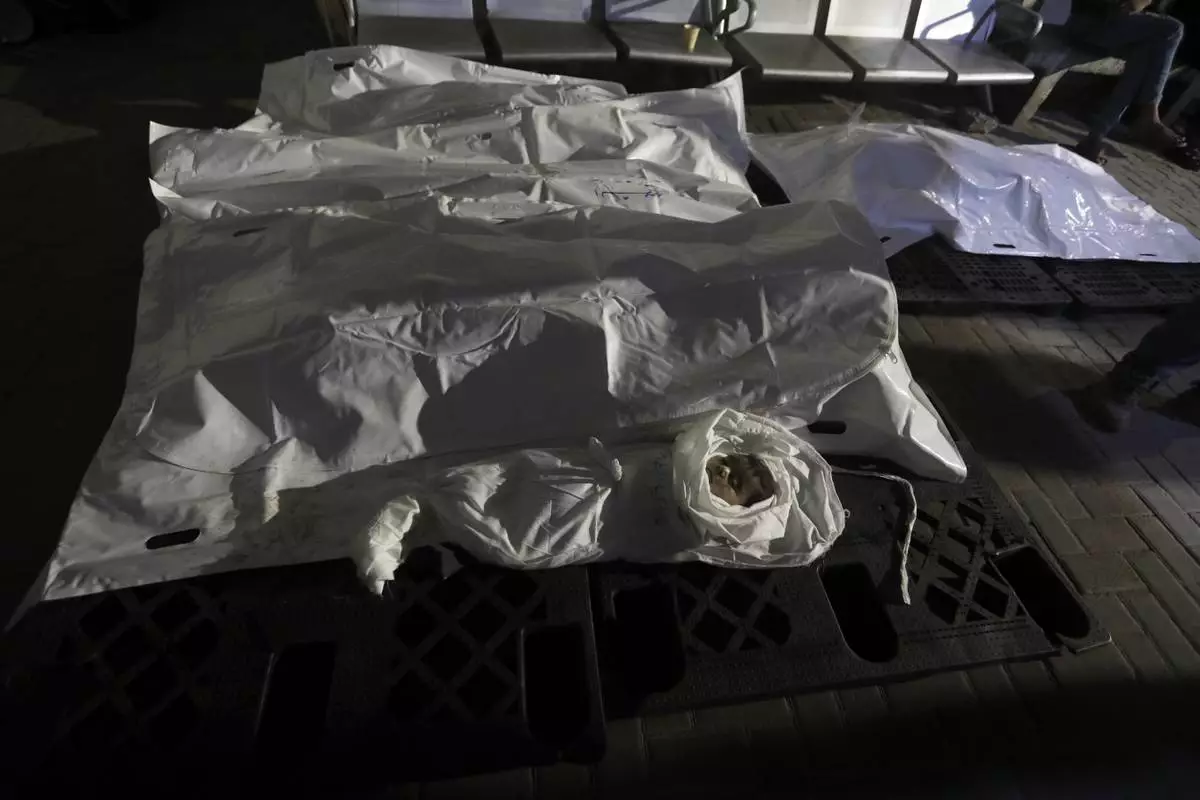
The Qeshta family is seen in body bags at the morgue of Al Najjar hospital in Rafah, southern Gaza Strip, Sunday, May 5, 2024. The family was killed in an Israeli bombardment on a residential building in Rafah. (AP Photo/Ismael Abu Dayyah)
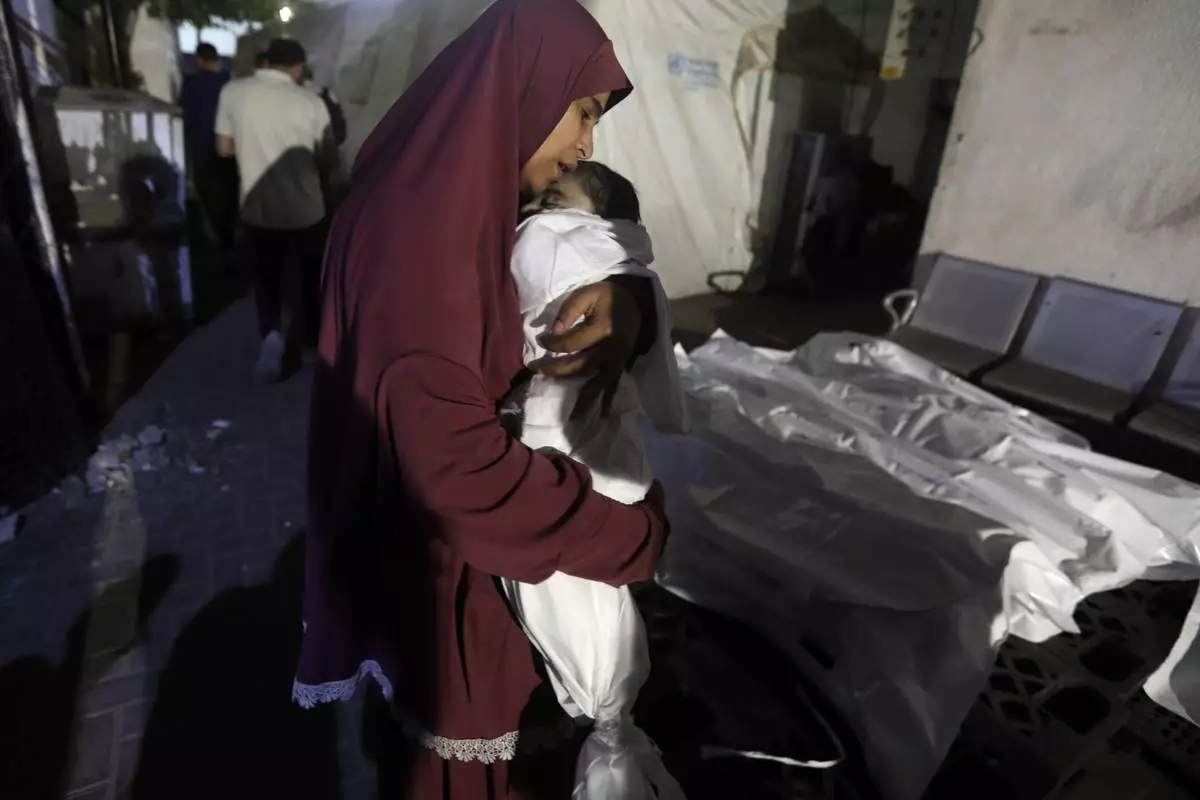
A Palestinian woman mourns her relative, 7-month old baby Hani Qeshta, who was killed in an Israeli bombardment on a residential building with Qeshta's family, at the morgue of Al Najjar hospital in Rafah, southern Gaza Strip, Sunday, May 5, 2024. (AP Photo/Ismael Abu Dayyah)






























